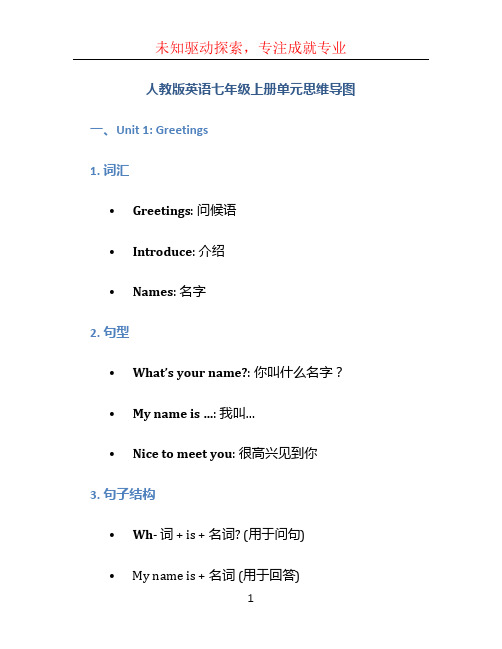【思维导图】初中英语完整版
人教版九年级英语各单元主题思维导图(1-10)

Key verbs
learn, study Improve, practice, repeat review, connect develop, discover, succeed increase, etc.
Challenges
speak too quickly (be)afraid to ask questions make mistakes in grammar can’t understand spoken English can’t get the pronunciation right don't know how to increase my reading speed don't know enough words to write well don't get much writing practice get bored ...
• 人教版九年级英语各单元主题思维导图(1—10单元)
初中英语人教版九年级全一册
Unit1 How can we become good learners?
单元主题思维导图
How Can You Become a Successful leaner?
阅读篇-Section B 2b
Section B 2b
Ask questions during or after class
Learning how to learn
单元整体话题篇
Structures
A: Do you learn English by reading aloud? B: Yes, I do. It helps with my pronunciation A: How can I improve my pronunciation? B: Well, one way is by listening to tapes.
七年级下册英语全册思维导图

七年级下册英语全册思维导图Unit 1: These are my teachers.•Vocabulary–school subjects–teachers–classroom objects–adjectives to describe people•Grammar–subject pronouns and possessive pronouns–using ‘be’ to describe people and things–using ‘have’ to show possession–asking and answering questions using ‘wh-’ words•Skills–introducing people–talking about school subjects and teachers–describing people–asking and answering questions about possessionUnit 2: This is my school.•Vocabulary–places in a school–prepositions of place–numbers 1-1000–adverbs of frequency•Grammar–using ‘there is’ and ‘there are’–using the verb ‘have’ with objects and rooms–using prepositions to describe location–forming questions with ‘where’ and giving answers•Skills–talking about your school–giving directions in a school–describing locations–asking and answering questions about places Unit 3: How do you study for a test?•Vocabulary–school activities and supplies–adverbs of manner–adjectives to describe actions–time expressions•Grammar–using present simple tense to talk about routines and habits–using adverbs of manner to describe how things are done–using adjectives to describe actions–using time expressions to talk about frequency •Skills–talking about daily routines–discussing how to study for a test–describing actions using adjectives–expressing frequency using adverbsUnit 4: I love learning English!•Vocabulary–adjectives describing feelings–types of music–activities–opinions•Grammar–using present continuous tense to talk about actions happening now–using ‘like’, ‘love’, ‘enjoy’ to talk about hobbies and activities–using adjectives to describe feelings–expressing opinions using ‘I think’, ‘I believe’•Skills–talking about hobbies and activities–expressing likes and dislikes–describing feelings–giving opinionsUnit 5: How’s the weather?•Vocabulary–weather conditions–seasons–types of clothing•Grammar–using present simple tense to talk about weather–using ‘it’ to refer to the weather–using prepositional phrases to describe weather conditions•Skills–talking about the weather–describing seasons and clothing–making predictions about the weather–giving weather forecastsUnit 6: What’s your favorite day?•Vocabulary–days of the week–activities–ordinal numbers–adjectives to describe activities•Grammar–using ‘what’ to ask about favorite things–using ordinal numbers to talk about the order of days–using adjectives to describe activities •Skills–talking about favorite activities–discussing daily routines on different days–using ordinal numbers–describing activities using adjectivesUnit 7: I want to be a basketball player.•Vocabulary–jobs–sports–school subjects related to jobs–adjectives to describe jobs•Grammar–using ‘want to’ to talk about future plans–using ‘be going to’ to talk about future intentions–using adjectives to describe jobs–using ‘because’ to give reasons•Skills–talking about future plans and intentions–discussing different jobs–describing jobs using adjectives–giving reasons using ‘because’Unit 8: Where’s the post office?•Vocabulary–places in a city–directions–prepositions of movement–adjectives to describe cities•Grammar–using ‘Can you…’ to ask for help–using imperatives to give instructions–using prepositions of movement to give directions–using ‘there is’ and ‘there are’ to talk about places in a city•Skills–asking for and giving directions–describing places in a city–using imperatives to give instructions–talking about different citiesUnit 9: How do you make a banana smoothie?•Vocabulary–food and drinks–kitchen utensils–imperatives for cooking–adjectives to describe food and taste •Grammar–using imperatives to give instructions for cooking–using ‘how much’ and ‘how many’ to ask about quantities–using adjectives to describe food and taste–using ‘like’ to express preferences•Skills–talking about cooking and food preferences–giving instructions for making a recipe–describing food and taste–asking about quantitiesUnit 10: I’m watching TV.•Vocabulary–activities–types of TV programs–time expressions–adjectives to describe TV programs •Grammar–using present continuous tense to talk about actions happening now未知驱动探索,专注成就专业–using adjectives to describe TV programs–using time expressions to talk about frequency •Skills–discussing TV programs and activities–talking about what is happening now–describing TV programs using adjectives–expressing frequency of activities11。
人教版七年级上英语各单元主题思维导图

Numbers
Names
Last name
Brown, Miller, Green, Smith
zero, one, two, three, four, five, six, seven, eight, nine
First names
Gina, Jenny, Mary, Linda, Jane, Alan, Tom, Mike, Jack
Furniture
table, bed, sofa, chair, desk, bookcase,…
Unit5 Do you have a soccer ball?
单元主题思维导图
询问并描述物 品所属关系
Cindy: Hey. Helen, let's go! _W__e_’r_e_l_a_te__! Helen: OK. Cindy: _D_o__y_o_u_h_a_v_e__a_p_i_n_g_-p_o_n_g__b_a_t_? Helen: _Y_e_s,_I_d_o_. It's in my bag. Cindy: And_w__h_e_r_e_'s_o_u_r__b_a_se_b_a_l_l_b_a_t__? Helen: Bill has it. Cindy: Oh, yeah. And__d_o_y_o_u__h_a_ve__y_o_u_r_j_a_ck_e_t_? Helen:_O_h_,_n_o_,_I_d_o__n_'t_. It's on the chair. Let me get it. Cindy: And your hat, too! Helen: OK,I_h_a_v_e__m_y__ja_c_k_e_t_a_n_d__h_a_t . Let's go !
人教版英语七年级上册单元思维导图

人教版英语七年级上册单元思维导图一、Unit 1: Greetings1. 词汇•Greetings: 问候语•Introduce: 介绍•Names: 名字2. 句型•What’s your name?: 你叫什么名字?•My name is …: 我叫…•Nice to meet you: 很高兴见到你3. 句子结构•Wh-词 + is + 名词? (用于问句)•My name is + 名词 (用于回答)二、Unit 2: My Family1. 词汇•Family: 家庭•Father/Mother: 父亲/母亲•Brother/Sister: 兄弟/姐妹2. 句型•This is my …: 这是我的…•I have …: 我有…3. 句子结构•This is + 表示家庭关系的名词 + 的 + 名词 (用于介绍亲属关系)•I have + 表示家庭关系的名词 + (用于介绍自己的家庭成员)三、Unit 3: School Life1. 词汇•School: 学校•Classroom: 教室•Teacher: 老师•Student: 学生2. 句型•What’s this?: 这是什么?•It’s a …: 它是一…3. 句子结构•What’s + 它的名词? (用于问句)•It’s a + 它的名词 (用于回答)四、Unit 4: Colors and Numbers1. 词汇•Color: 颜色•Number: 数字•Red/Yellow/Blue: 红色/黄色/蓝色2. 句型•What color is it?: 它是什么颜色的?•It’s …: 它是…3. 句子结构•What color + 名词? (用于问句)•It’s + 颜色名词 (用于回答)五、Unit 5: Food and Drinks1. 词汇•Food: 食物•Drink: 饮料•Apple/Banana/Orange: 苹果/香蕉/橙子2. 句型•I like …: 我喜欢…•Do you like …?: 你喜欢…吗?•Yes, I do/No, I don’t: 是的,我喜欢/不,我不喜欢3. 句子结构•I like + 食物名词 (用于表达自己喜欢的食物)•Do you like + 食物名词? (用于问句)•Yes, I do/No, I don’t (用于回答)六、Unit 6: Hobbies1. 词汇•Hobbies: 爱好•Swimming/Dancing/Reading: 游泳/跳舞/阅读2. 句型•What’s your hobby?: 你的爱好是什么?•My hobby is …: 我的爱好是…3. 句子结构•What’s + 表示爱好的名词 + ? (用于问句)•My hobby is + 表示爱好的名词 (用于回答)通过这份思维导图,我们可以清楚地了解到七年级上册的各个单元的重点内容和基本句型。
